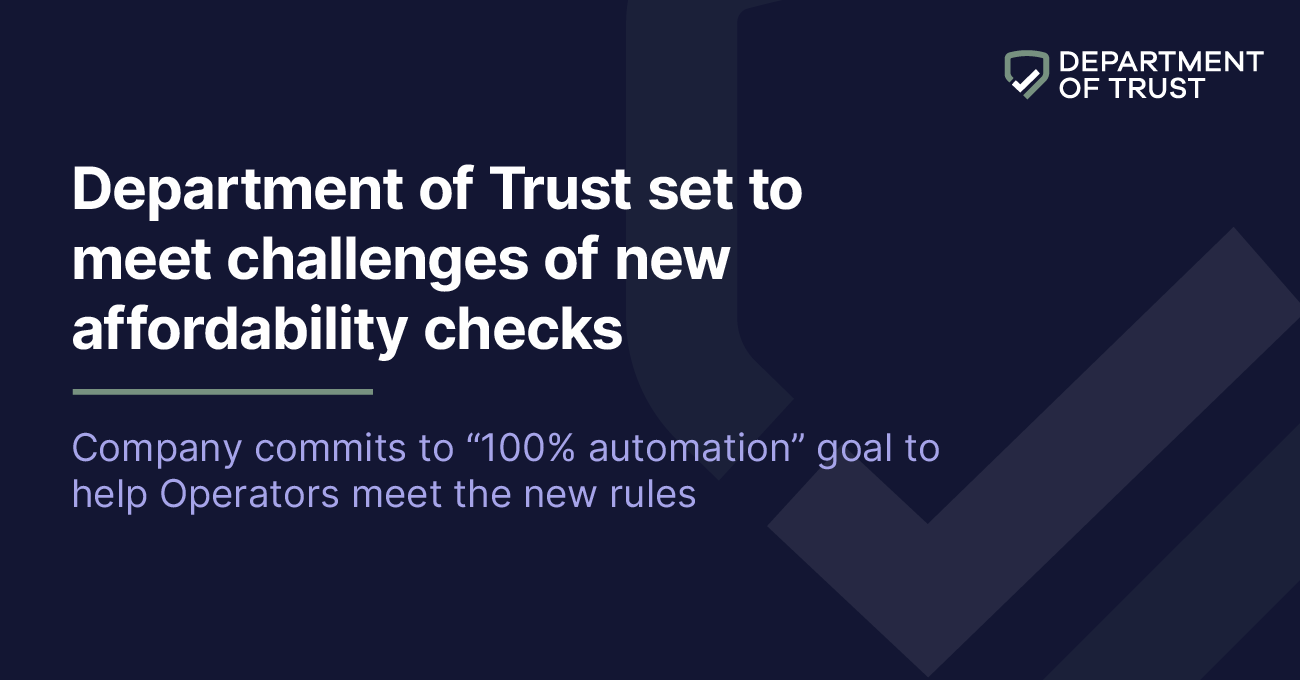Compliance Updates
Ireland Implements Interim Gaming and Lotteries Act
The new interim Gaming and Lotteries Act in Ireland has come into force, modernising the promotion of gaming and standardising a minimum age of 18 for all gambling products.
The interim Act has been introduced ahead of a more comprehensive overhaul of gambling regulation planned for next year.
James Browne, minister with special responsibility for gambling regulation, said: “This act modernises the Gaming and Lotteries Act 1956 and will help the better promotion of local gaming and lottery activity.
“These activities, held primarily for charitable and philanthropic purposes, are the lifeblood of our sporting clubs and community organisations across the country.”
The new act sets a minimum age limit of 18 for all forms of gambling, including betting on the Tote, which previously had no age limit.
It also aims to streamline and modernise the application process for gaming and lottery permits and for licences to run small-scale, local gaming and lottery activity. It also adds more consumer protection rules to the promotion of gaming products. It also directs more proceeds from lotteries go to charitable causes.
Minister Browne said: “Gambling is a large and evolving industry. It must be the subject of a modern, sensible and effective licensing and regulatory approach.
“My department is now engaged in the drafting of a general scheme of a new bill to provide for that comprehensive reform.”
The changes will not affect end-of-year draws, the minister said. Permits and licences already issued under the 1956 act will remain valid until their next renewal date.
Compliance Updates
A New Analysis by EGBA Reveals Notable Shift Towards Multi-licensing for Online Gambling Across Europe
A new analysis by EGBA concludes that 27 out of 31 European countries employ some form of multi-licensing for online gambling, with an overwhelming majority implementing a full multi-licensing approach.
In recent years, Europe has experienced a remarkable transformation in online gambling regulation. Just fifteen years ago, the landscape was vastly different. Most European countries lacked dedicated regulations for online gambling or operated under exclusive rights models where only state-owned entities had a monopoly to offer online gambling services.
But fast forward to today and the situation has evolved significantly. A new analysis by the European Gaming and Betting Association (EGBA) concludes that the multi-licensing model has become the predominant regulatory approach in Europe. Under this model, multiple companies are permitted to offer online gambling services within a country, provided they comply with strict regulatory obligations.
Key findings of the analysis:
- 27 out of 31 European countries have adopted some form of multi-licensing, indicating a robust trend towards open, competitive markets.
- Four countries currently do not have any form of multi-licensing: Finland, Iceland, and Norway maintain exclusive rights models, granting state-owned entities a monopoly over all online gambling services, while Luxembourg lacks dedicated regulations for online gambling.
- Of the 27 countries with multi-licensing, 23 countries have a full multi-licensing model for all regulated online gambling products in those countries.
- Four countries have a mixed model with partial multi-licensing: Slovenia and Switzerland each have a monopoly for online sports betting, while Austria and Poland each have a monopoly for online casino gaming and poker, with multi-licensing for all other online gambling products.
- Cyprus (casino gaming and poker) and France (casino gaming) each impose product-specific prohibitions but both have multi-licensing for all other regulated online gambling products.
- Finland is currently undergoing legislative reforms, and is expected to establish a multi-licensing framework for online gambling in 2026.
Maarten Haijer, Secretary General of EGBA, said: “The momentum towards full multi-licensing for online gambling in Europe is undeniable. While a few exceptions still exist, governments are concluding that public policy objectives, particularly related to consumer protection and tax generation, are more effectively met through well-regulated online competition. Finland’s current transition towards multi-licensing signals the impending end of the last online gambling monopoly in the EU, marking a significant regulatory milestone.
“Similar deliberations regarding the future of the online monopoly are inevitable in Norway and Iceland. Furthermore, the handful of countries with either partial monopolies or product prohibitions should strive for greater consistency and effectiveness in their policies by phasing these out. With over 15 years of regulatory experience in Europe, it’s clear that full multi-licensing offers the best pathway to enhance consumer protection, increase tax revenues, and ensure stronger regulatory control. The time has come for the last remaining European countries to embrace this optimal form of online regulation.”
The post A New Analysis by EGBA Reveals Notable Shift Towards Multi-licensing for Online Gambling Across Europe appeared first on European Gaming Industry News.
Compliance Updates
Spinomenal is now a registered provider in Peru

Spinomenal, the leading iGaming content provider, has expanded its Latin American presence by registering as a service provider in Peru. The approval from Peru’s Ministry of Foreign Trade and Tourism (MINCETUR) allows Spinomenal to provide its casino titles to the country’s locally licensed operators.
With Peru’s recent introduction of new gaming regulations, the iGaming environment is set for an exciting transformation. Spinomenal is thrilled to be part of this dynamic evolution, offering our state-of-the-art gaming solutions to energise and enhance the gaming experience within Peru’s thriving iGaming community.
Peruvian players will now be able to enjoy Spinomenal’s popular portfolio of games and some of the gems available are Majestic King and Demi Gods V.
Spinomenal CO-CEO, Lior Shvartz commented: “Latin America continues to be a key region for us and we’re proud to now be able to offer our titles within the regulated Peruvian market. Games have been hand-picked for Peruvians based on localised knowledge of player preferences gained by our experience in the market prior to the new regulation.”
Compliance Updates
Department of Trust set to meet challenges of new affordability checks

Department of Trust (dotrust.co.uk), the award-winning provider of financial risk assessments for safer gambling is poised to meet the challenges of the newly announced regulations on frictionless financial checks by the UK Gambling Commission and Betting and Gaming Council.
Under the new rules published by the Gambling Commission, operators have until August 30th to implement frictionless checks on all customers making £500 net deposits in any rolling 30-day period. These frictionless checks form part of a new regime designed to protect players at risk of financial harm and replace the current ad hoc approach to affordability checks.
Department of Trust also welcomes the interim voluntary code published today by the Betting and Gaming Council (BGC), the standards body representing over 90% of UK-regulated market operators. This code focuses on how responsible operators should support customers spending above the lower threshold set out by the Gambling Commission.
The supplier’s DoTrust Complete solution offers an integrated suite of frictionless and enhanced financial risk checks with a high level of automation capability -the only such tool built solely for safer gambling – and is perfectly positioned to help businesses navigate the newly regulated waters.
Charles Cohen, CEO of Department of Trust, said: “These important announcements flag the end of gambling’s ‘sus law’ where players faced seemingly arbitrary requests for personal information, operators were placed under a significant burden, and no one won
“We now know that in 120 days, every operator will need to perform frictionless checks on all players with net deposits in a 30-day rolling period of £500. A few months later this will fall to a much lower level.
“If operators want to protect their business, keep their customers and reduce costs, smart automation is the only answer.
“Department of Trust has spent over two years building the leading plug-and-play solution specifically for the gambling industry. Complete already automates over 90% of the processes required in both the new LCCP and BGC code. Now we know what the requirement will be, we are today committing to the goal of 100%. We want every operator and player to have instant assessments and sensible decisions cost-effectively. No one needs to lose sleep over this.”.
The post Department of Trust set to meet challenges of new affordability checks appeared first on European Gaming Industry News.
-

 gaming2 years ago
gaming2 years agoODIN by 4Players: Immersive, state-of-the-art in-game audio launches into the next generation of gaming
-
EEG iGaming Directory7 years ago
iSoftBet continues to grow with new release Forest Mania
-
News6 years ago
Softbroke collaborates with Asia Live Tech for the expansion of the service line in the igaming market
-
News5 years ago
Super Bowl LIII: NFL Fans Can Bet on the #1 Sportsbook Review Site Betting-Super-Bowl.com, Providing Free Unbiased and Trusted News, Picks and Predictions
-
iGaming Industry6 years ago
Rick Meitzler appointed to the Indian Gaming Magazine Advisory Board for 2018
-
News5 years ago
REVEALED: Top eSports players set to earn $3.2 million in 2019
-
iGaming Industry6 years ago
French Senator raises Loot Boxes to France’s Gambling Regulator
-
News6 years ago
Exclusive Interview with Miklos Handa (Founder of the email marketing solutions, “MailMike.net”), speaker at Vienna International Gaming Expo 2018












